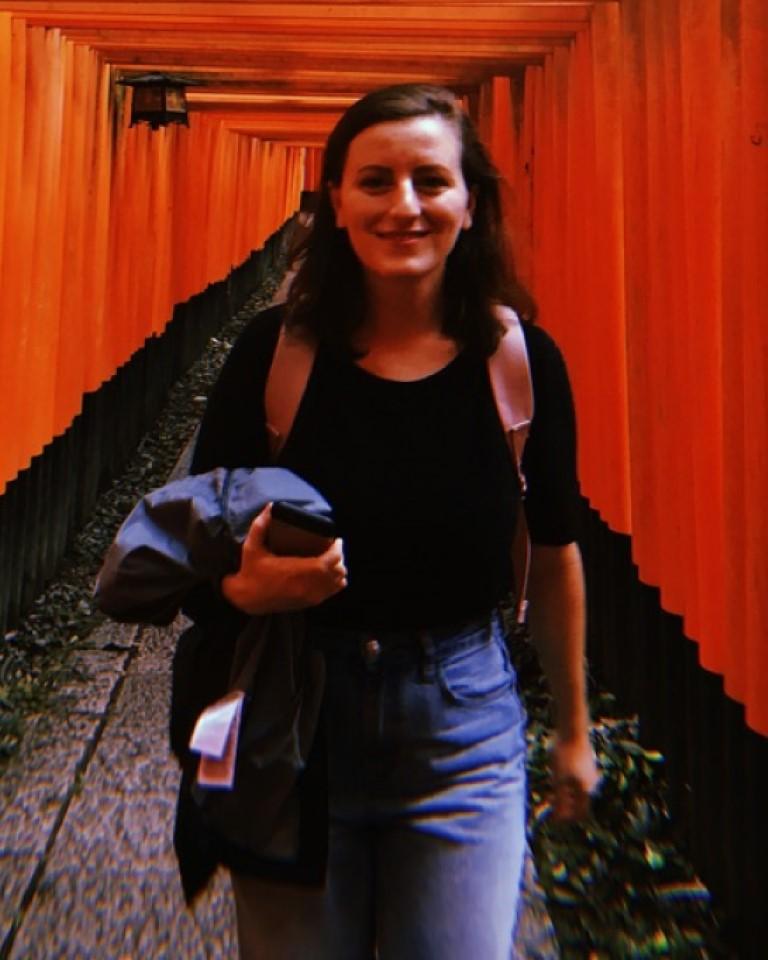Emily Grantham

April 2022 Alumni Spotlight
KU Major: Neurobiology
Graduation Year: 2016
Current Occupation: Postdoctoral Researcher
List the faculty member, staff, graduate student, or postdoc who mentored your research or creative project: Justin Bluminstiel
Describe the undergraduate research/creative experience that you had while at KU: In Dr. Blumenstiel’s lab, I conducted an independent research project studying the regulation of transposable elements in the germline of Drosophila melanogaster by small RNAs called piRNAs. I accomplished this through small RNA sequencing. My research demonstrated a particular truncated Doc element triggered small RNA (piRNA) biogenesis in a meiotic gene nearby, resulting in semi-sterile female flies. Additionally, in contrast to what had been previously thought, I showed that TE promoter activity was sufficient, but not necessary, to trigger piRNA biogenesis. I showed this by mapping piRNAs to known Doc elements throughout the genome and used logistic regression to quantify the likelihood of piRNA presence at that TE given the presence of its promoter sequence. Overall, this research has implications for small RNA modifications capable of regulating gene expression. I presented my research findings at an honors biology symposium and in a written honors thesis.
Questions:
Q: What did your research or creative project look like on a day-to-day basis? What did you spend most of your time doing?
A: I spent most of my time flipping fly stocks, collecting virgin females, and harvesting their ovaries so that I could isolate the RNA from them for my experiments. We opted to do the small RNA isolation ourselves rather than use a kit or pay a third-party vendor, so I spent a lot of time in the lab learning and optimizing the protocol, which was lengthy. I spent most of time when I wasn't in class in the lab running experiments, helping with collective lab duties, attending lab meetings, and reading papers.
Q: What do you think was the most important thing you learned while doing undergraduate research?
A: The most important thing I learned was probably time management. Once I figured out that I was in charge of my own project and whether or not it came to fruition was completely up to me, I sat down and figured out how to plan out a day-to-day schedule that would work with my course workload. The independence I was offered to work on my own project became critical when I went to graduate school and was expected to have a handle on my time and project management skills from the start.
Q: What advice do you have for undergraduates who might be interested in doing research or creative scholarship?
A: Reach out to professors and TAs whose work or teaching interests you. Don't be afraid to cold-email a professor to ask them for their advice. Some are extremely busy and may not get back to you, but most are very helpful. Even if they don't have room in their lab to take a student, they may have useful advice about how to get there eventually or even other opportunities you may not be aware of.
Q: Do you use any of the skills or perspectives gained doing research in your current occupation? How so?
A: I use many skills I gained during my undergraduate experience in my current occupation as they are very similar. I learned foundational molecular biology techniques that I still use today. I learned time management skills that were critical for my success in graduate school. I learned how to read a scientific paper, which wasn't taught in any of my courses, but is probably one of the most important skills for a career in research. I also learned how to think critically and write scientifically. Most importantly, I think, I learned how to fail. During your first experiences in the lab, you are very likely to make mistakes as part of the learning process. I had a research project that didn't pan out initially. I had to pivot to make the most of my results, even though they did not seem interesting. During my early days in the lab, I felt like I was not smart enough to be there because I made mistakes that to more experienced people probably seemed simple. However, this was how I learned. If you're a high-achieving student, this may feel unfamiliar and uncomfortable, but learning how to take criticism, accept failure, and learn from it is one of the most important skills you can develop as a student and one I use regularly in and outside the lab.
Q: Many undergraduate researchers are making decisions about what to do after they graduate from KU. Having been in those shoes, what do you know now that you wish you’d known then? Do you have any advice?
A: I wish I would have known about all of the opportunities that exist outside of going straight into graduate school. I am happy I ended up going to graduate school and there are many personal, financial, etc reasons that doing so may be the best course, however even after graduate school the career options for a person with independent research experience are vast. I wish I had known sooner about career options in industry, science policy, scientific writing, and others. My advice would be to seek out mentors who support your development as an individual, regardless of your path in academia. I was always lucky to have mentors that supported my interests in and outside the lab and made an effort to connect me with people who could help me achieve my career goals. I only wish there were more opportunities for students to learn about careers outside of academia, as professors' knowledge is often limited to their experience.
Twitter: @Emily_Grantham_